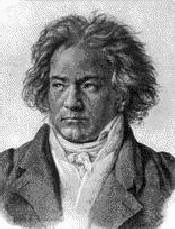 |
Ludwig van Beethoven is arguably the best composer of classical music. Only Mozart rivals him. Though Beethoven is famous, few know of his life and hardships.
Beethoven was born on December 16th, 1770 in Bonn, Germany. By the time Beethoven was 13, he was supporting the family as a court musician and had written his first symphony. In 1787, Beethoven met Wolfgang Amadeus Mozart and began to study music with him. After Mozart died in 1791, Beethoven studied with Joseph Haydn. He was also a student of Johann Schenk, Johann Georg Albrechtsberger, and Antonio Salieri, all famous musician-composers of the day.
 |
In 1801, Beethoven wrote letters to his friends that revealed he was slowly losing his hearing. This admission must have been very difficult for him, and yet his increasing deafness did not end his career as a composer, or even slow it down. In 1802, Ludwig wrote the Heiligenstadt Testament, a moving letter in that time of personal crisis. But at the same time, he was still composing; the "Moonlight" Sonata, the "Eroica" symphony and, within a few years, "Fidelio," his only opera.
 |
Beethoven's fame reached its peak in 1814, when he successfully revived "Fidelio." In 1817, Beethoven started composing his famous Symphony #9, which contains "Ode to Joy." He died March 26, 1827, while a violent storm raged.
Ludwig van Beethoven had a very difficult but interesting life. Beethoven's music is very influential today; it forms the backbone of orchestral and chamber music repertoires around the world.
Page created on 11/24/2006 11:10:19 AM
Last edited 11/24/2006 11:10:19 AM
Official website of Beethoven-Haus in Bonn, Germany Links to extensive studio and digital archive, library holdings, the Beethoven-Haus Museum (including "internet exhibitions" and "virtual visits"), the Beethoven-Archiv research center, and information on Beethoven publications of interest to the specialist and general reader. Extensive collection of Beethoven's compositions and written documents, with sound samples and a digital reconstruction of his last house in Vienna.
